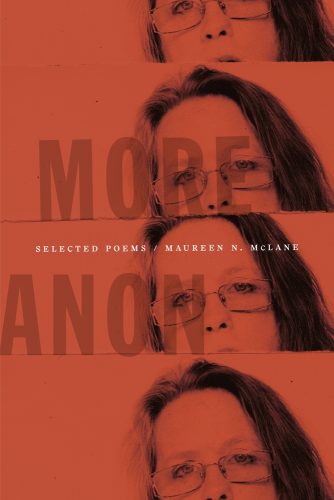Poetry Review: Maureen N. McLane’s “More Anon” — Lots of Existential Fun
By J. Kates
Her poems are sassy.
More Anon: Selected Poems by Maureen N. McLane. Farrar, Straus and Giroux, 224 Pages, $30.

Before this volume landed on my doorstep, I had never heard of Maureen N. McLane nor read her poems. Apparently enough other people have — she has won some prestigious awards and is comfortably installed in the Establishment — so it appears that I am the only one who has missed out by my ignorance. That has been my loss up until now, your gain if you’ve been like me but will pick up on her as soon as possible.
The quality that comes most quickly to mind in beginning to read McLane is one too often gendered in its application, but with meaning beyond all that: Her poems are sassy. In this, she reminds me of the Canadian Irving Layton. Embedded in the word is a grand sense of existential fun. This is, I hasten to add, a question of tone. It does not at all mean to trivialize the content.
An acquaintance recently praised a poem he had read as “a very effective mix of long and close views.” Hmm, I thought to myself, isn’t that the work of every poem?
It certainly pinpoints the success of Maureen McLane’s poetry. Almost at dead center in More Anon, “Terran Life” moves the speaker’s “little stratospheric eye” from “bones in the earth” through “the restored ceiling of the Sistine Chapel” and “the subtle shift from umber to somber to ochre on the walls of Les Caves de Lascaux” until she embraces the universe, but not alone: “Do you think I’m afraid of crashing to earth? / Love we’ve been falling ever since falling made way for a leap.”
And, at a time when too many things called poems are made up only of equal parts therapy and memoir — and a state’s “poet laureate” can say dismissively that she doesn’t pay attention to the words she uses — what should be a commonplace becomes a blessing: the attention McLane pays not just to the sound and the music but the way she makes these work for her. Take the single stanza
gulls alit on the lake
little white splendors
looking to shit on the dock
to see how the liquid l’s and the internal “it” rhyme (including that eye-rhyme of “white”) interweave with “lake,” “looking,” and “dock” setting up the discordant, accurate “shit.” Hidden within the “shit” and the “dock” is the shock of the image.
If this were all, it would not be enough. But McLane puts her virtuosity to expert use in deconstructing and reconstructing grand themes: love and loss.
“I take pleasure / annihilating all the world // to a penned thought caught / in a fan’s whirring blade,” McLane asserts in the very first poem in the book. Pay attention to the two words with double meanings in that simple assertion, “penned” and “fan.” Be on your guard while you continue to read. As she observes in another poem early in the book, “some people wonder / why others distrust the obvious.”
Pay attention also to the submerged allusion to Andrew Marvell’s “annihilating all that’s made / to a green thought in a green shade.” McLane is well read, and she draws deeply from that well, from Akhmatova to zenana, to irrigate her own writing. Her brashness is rooted in a deep and broad literacy.
Not only with content and allusion, McLane can be sly with an embedded sonnet, and she makes the best use of a triolet stanza in “Songs of a Season II” since Don Marquis’s “mehitabel’s song,” but with far more gravity and intensity, exploiting the particular obsession of the form:
Never again to visit that place
And never to think of it.
Never to see again that face
Never to visit that place
Never to try to stash the suitcase
In an overhead bin it won’t fit.
Never again to visit that place
And never to think of it.
How the word “suitcase” sticks out there, uncrammable into its bin, packed with all the poem’s baggage.
A substantial chunk of More Anon engages the world through the mind of “Mz N,” who might be thought of as a love-child of Virginia Woolf’s Mrs. Ramsay (specifically invoked in “Mz N No Permanent Mind”) and John Berryman’s Henry. Through 13 poems Mz N is thoroughly modernist in her style as well as contemporary in her thinking:
There are other nodes
other genres
Other genders
One can be visible
in the world & invisible
One can be a glacier
only the tip of yourself visible
in the open cold blue air
Not just love and loss are chronicled in More Anon, but love and the universe and what can be found again under “the same old same old sun” as McLane performs the primary duty of the poet:
every day the world exists
to be named.
J. Kates is a poet, feature journalist and reviewer, literary translator, and the president and co-director of Zephyr Press, a nonprofit press that focuses on contemporary works in translation from Russia, Eastern Europe, and Asia. His latest book is Paper-thin Skin (Zephyr Press), a translation of the Kazakhstani poet Aigerim Tazhi.
Tagged: Farrar Straus and Giroux, Jim Kates, Maureen N. McLane, More Anon
